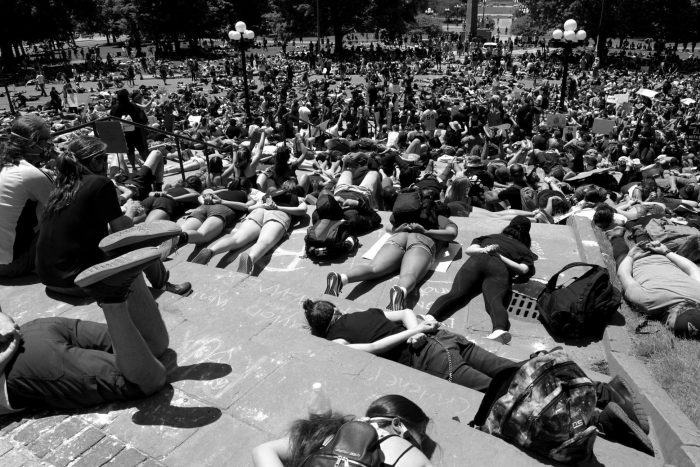Dear defensive white people,
The feeling of defensiveness is a compass for the places within ourselves where we still have room to grow.
It’s a guide that shows us where we’re not quite right, and if we listen, it gives us the wisdom to heal ourselves and our communities.
It’s no secret that America was founded on systemic racism. Racism has been part of the lifeblood of this country from the beginning. Police murdering innocent Black people and throwing them in prison without cause has been happening for centuries.
Right now, our country is at a jumping-off point. We’ve had countless opportunities to come to this point, but for many reasons, this moment in time is a perfect storm of horror and injustice, and folks are waking up. As white people, we have to get our sh*t together, because opportunities for real change don’t come every day.
There are a million blogs that tell you what you can do to support Black folks right now and you should read them and do the things on them. Listen to Black people, donate to the NAACP, read the books, watch the movies, go to protests, educate your children—do all those things. And also do your inside work.
I’ve been seeing posts on social media from people who I believe think of themselves as “progressive, anti-racist allies” about how the property damage that has been happening this week is unforgivable, or that “yes Black lives matter, but so do everyone else’s.” I’ve read white people’s posts that are defensive and angry because they don’t want to be perceived as racist.
And honestly folks, we’re the problem.
Feeling defensive—you know the feeling: your heart speeds up, your blood pulses, your mind goes into overdrive to prove how right you are—is an invitation. And white people, we need to start accepting the invitation. It’s an offering that our body and mind give us to:
- Slow the f*ck down. Before anything else, slow down. Notice the feelings in your body and why you want to react. Choose to do the opposite of what you normally do, and just wait.
- Get curious. Ask yourself what is under the defensiveness. Then ask yourself what is under that. Then what is under that. Do this until you touch the thing that makes you want to cry—that spot that feels tender. Maybe it’s, “I am so scared that I am racist” or maybe it’s, “I feel hopeless,” or maybe it’s something else. Keep digging until you feel your heart break open a little.
- Talk to an ally you trust. Maybe it’s your therapist (a good choice), or a trusted friend or partner who has done their work to understand racism. Be willing to show that vulnerability (not on Facebook, y’all) and ask questions about how to work through your underlying feelings.
- Course correct. If you offended or hurt someone, make amends. With your words and your actions.
Then, do better. We can’t do better until we know better. And we can’t know better until we’re willing to be honest. Really honest.
Tackling racism is squarely on us. We should be in this fight like our lives and our communities depend on it, because they do. It’s okay to feel scared, unsure, insecure, like you might say the wrong thing. Hell, it’s okay to say the wrong thing. But we also have to be willing to do the hard work of both making it right and then doing right.
I’ve decided that I’ll always accept the invitation of defensiveness, and I hope that you’ll join me. We can’t heal something we aren’t willing to touch, and it’s past time to heal.











Read 1 comment and reply